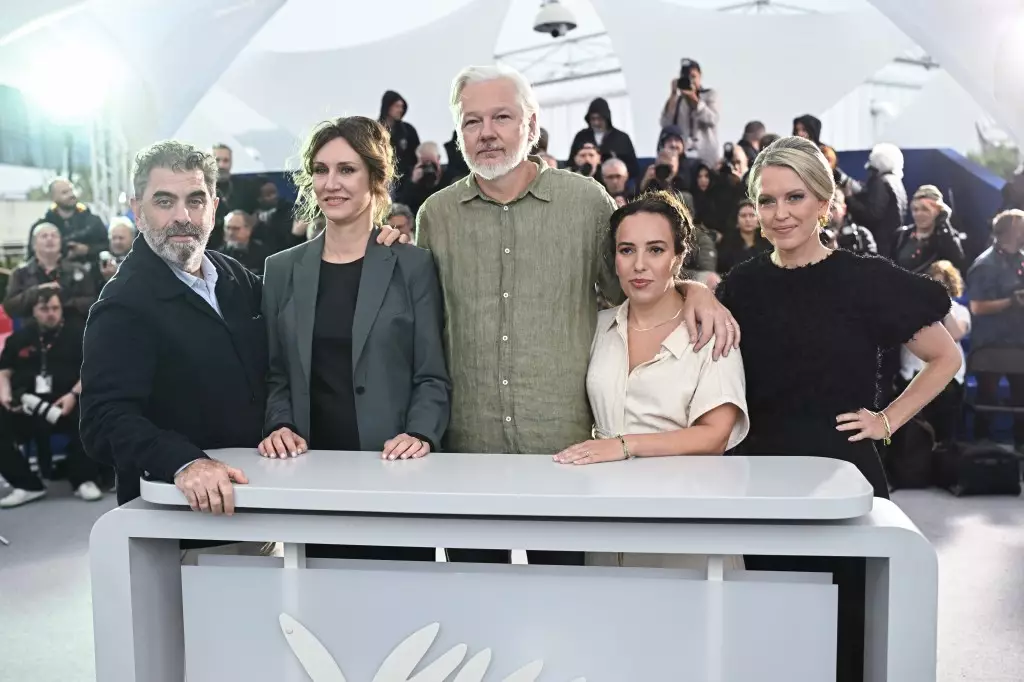In an era where information is power, WikiLeaks stood as a beacon for transparency and whistleblowing. Founded by Julian Assange, this platform disrupted the traditional narrative of journalism by unveiling secrets that many governments would rather keep buried. Yet, the last five years have exposed a startling and discouraging trend: not a single document has been released by WikiLeaks. This alarming silence can be interpreted as a victory for those who prefer a veil of secrecy over accountability; however, it represents a gut-wrenching loss for the ideals of democracy itself.
What makes this story more poignant is the context provided by Eugene Jarecki’s documentary *The Six Billion Dollar Man*, premiered at the Cannes Film Festival. Jarecki sheds light on a systematic effort orchestrated over fifteen years by various U.S. administrations to dismantle Assange and WikiLeaks. The staggering claim that the U.S. government supposedly expended $6 billion in this crusade raises uncomfortable questions about the lengths to which power will go to silence dissent. In a time when whistleblowers should be protected and celebrated, it seems that a hefty price tag has been placed on integrity and transparency.
The Exploitation of Economies
The film reveals that while legal fees contribute to the immense sum spent on attacking Assange, the considerable bulk of that $6 billion emerged from diplomatic maneuvers. Jarecki points to a troubling tactic—a financial aid package promised to Ecuador during the Trump administration, leveraged to secure Assange’s extradition. Such an approach highlights how economic pressures are used in international relations, often at the expense of democratic values and human rights.
When Assange was granted asylum at the Ecuadorian Embassy in London, he became a symbol of resistance. Yet, as Jarecki argues, the U.S. government’s ability to trade financial support for compliance reflects a deeper malaise within international diplomacy—a creeping reality where power and money trump ethical considerations. This raises an unsettling truth: the landscape of global governance can often resemble a game of chess, with vulnerable countries placed in check by those who wield economic might.
A Cautionary Tale
The timeline of Assange’s struggles, including the withdrawal of his asylum and the five years spent in a U.K. prison, lays bare the adversarial relationship between state accountability and individual rights. The implications of the U.S. government’s relentless pursuit of Assange extend beyond his personal tale; they resonate with anyone who dares to challenge authority, suggesting a growing intolerance for transparency and dissent.
In *The Six Billion Dollar Man*, Jarecki presents Assange not merely as an individual but as a potent symbol of the clash between state power and the fundamental right to information. Assange’s recent deal with U.S. authorities, where he pleaded guilty to disseminating classified information for the opportunity to return home to Australia, is more than just a legal maneuver. It serves as a poignant reminder of the sacrifices made for the greater good. Perhaps his path was not simply one of victory, but rather an illustration of the costs associated with speaking truth to power.
The Irony of Recognition
Viewing the film at Cannes brings a distinct flavor of irony, as Assange is showcased as a cautionary tale amidst the glitz and glamour of the festival. The fact that *The Six Billion Dollar Man* won a Special Jury Prize, while simultaneously lacking U.S. distribution, speaks volumes about the current climate. Jarecki’s expectation that American distributors will be drawn to the film, a “catnip” in his words, underscores a troubling disconnect. The willingness of the entertainment industry to engage with Assange’s story juxtaposes the government’s reluctance to confront an uncomfortable legacy of silencing dissent.
Julian Assange, although presented as a figure of triumph in Jarecki’s film, highlights the stark reality that those who challenge the status quo often find themselves vilified. It leaves one questioning: how can a society that claims to value transparency allow such battles to unfold unchecked? The ongoing struggle between governmental authority and the freedom of information remains a hotbed of ethical dilemmas that challenge our very understanding of democracy. As Jarecki seeks to unveil the truth behind Assange’s plight, we must all grapple with what his story teaches us about accountability in the 21st century.


Leave a Reply